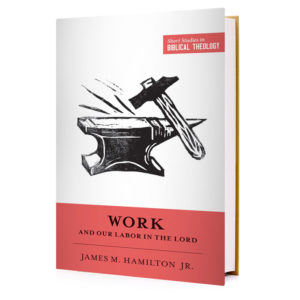Work and Our Labor in the Lord by James M. Hamilton Jr. (Crossway 2017, $14.99)
While Christians are surrounded by a secular culture that views work improperly — either as a demanding god or mind-numbing duty — the biblical storyline invites believers to see work as part of the very purpose of God’s image bearers, writes James M. Hamilton Jr. in his book, Work and Our Labor in the Lord.
In his contribution to Crossway’s Short Studies in Biblical Theology series, Hamilton, professor of biblical theology at Southern Seminary, lays out a robust biblical perspective on human work, detailing how it changes in each epoch of redemptive history. He describes work’s original intention (Creation), corruption (Fall), and ultimate fulfillment (Redemption and Restoration).
“Work is therefore built into the created order, right from the start,” Hamilton writes. “God gave men stewardship of the land and all life on it. All tasks man undertakes in God’s world can be seen in relationship to that original commission. Some jobs deal directly with plants and animals. Other jobs enable the stewardship of land and life. All jobs relate to those great tasks. The making of roads and markets enables us to subdue the earth and exercise dominion over the animals. The tasks related to helping other humans to flourish intellectually and spiritually enable people to deal with the land and living creatures. Arguably every righteous task in the world — from that of the farmer or rancher to that of the engineer, the software developer, or the nuclear physicist, from that of the ditchdigger to the physician, from the coach to the pastor, the zookeeper to the politician, the sergeant to the mailman — every task in the world can be seen in relationship to the subjection of the earth and the exercise of dominion over the animal kingdom.”
The story of the Bible opens with God working, affixing to work its identity as an “exalted, Godlike activity,” Hamilton writes. When the world fell because of sin, every part of Creation was affected, including work.
“[In the fall], God made the woman’s tasks of bearing children and helping the man more difficult, and he made the man’s task more difficult by cursing the ground, making toil painful and sweaty, and expelling man and woman from the garden,” Hamilton writes.
God did not simply create the world and let it operate on its own, but he continues to work in the midst of his creation, ultimately through his Son, Jesus Christ. Jesus’ work on his Father’s behalf (John 5:17) extends God’s activity from Creation through all history, ultimately culminating in a redeemed humanity that can live out the Edenic ideal for healthy work.
“As we wait for the redemption of our lowly bodies and resurrection from the dead, Christians are to work in ways that show love for God and neighbor,” Hamilton writes. “So doing will enable us to live out the image and likeness of the true and living God.”
Hard labor is not the only thing endorsed in the Creation Mandate. Since God himself worked in creation through speaking words, it validates all forms of work — even the sort of labor that is intellectual and communicating.
“God works by speaking words,” writes Hamilton. “Among other things, this validates all kinds of knowledge work in which the hard work of thinking and communicating accomplishes that those made in God’s image have set out to do.”
At the end of human history, when God remakes the world, transforming it from sin-stained to fully glorified, mankind will not enter a relaxed, easy, unworking state. Instead, the human race, fully restored and enlivened in the image of Christ, will be working in the way it was meant to from the beginning — without the pain, loss, and futility of work in a fallen world.
“We can scarcely imagine it, but everything that makes work miserable here will be removed. All our sinful concerns about ourselves will be swallowed up in devotion to the one we serve,” writes Hamilton. “All inclination to evil will have been removed from our hearts, so we will enjoy the freedom of wanting to obey, wanting to serve, wanting to do right.”
A helpful contribution to growing popular-level treatments of biblical theology, this volume provides practical instruction on work and demonstrates a strong hermeneutical method.





